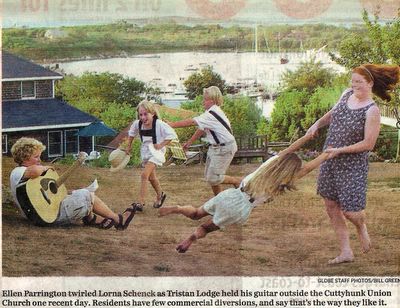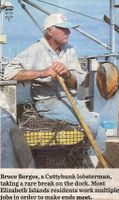
By David Abel | Globe Staff | 9/02/2002
GOSNOLD - When not debating budget issues as one of this small town's three selectmen, Kris Lombard is stocking her general store, serving as a librarian or teacher at the one-room schoolhouse, maintaining neighbors' homes, or checking on her husband, Asa, the town's harbormaster and waste department manager.
With few fires to tend to, Seth Garfield, chief of the town's volunteer fire department and chairman of the harbor committee, tends to his oyster farm, lawn-mowing business, and catering clients. When he can, he goes scuba diving to earn a few dollars from a local marine towing company.
And because being secretary for the town doesn't pay enough, Sara Smith also pumps gas at the fuel dock, cleans houses, and collects the mooring fees from visiting boaters.
"A lot of people do a lot of different jobs here - it's the only way to survive and maintain our lifestyle," Smith said.
With the lighthouse atop the rocky cliffs of Gay Head in view over on Martha's Vineyard, beach plums and blackberry bushes lining pristine beaches, and old cedar-shingle homes rising from a well-manicured hill on the most westward of the Elizabeth Islands, it's hard to tell that this town ranks as the poorest community in all of Massachusetts.
But on the 16 islands that make up the town of Gosnold, where many longtime residents wear multiple hats to make ends meet, few were surprised to learn the 2000 Census ranked their town's median income - $22,344 - below all others in the state.
Of course, with only 39 households surveyed, many here were quick to note that the unflattering statistic didn't reflect the real money in this town, which for decades has been the summer home of the Forbes family and other magnates.
Still, this isn't a wealthy community - and that's just the way the regulars like it. Long resistant to change, the scores who live here through winter and the hundreds who come every summer look across the Sound at the Vineyard and feel they're seeing their poorer cousin, an island overrun by tourists and drowning in commercialism.
On Cuttyhunk, the island with the largest year-round
 population and the only one open to the public, Bruce Borges says he's little different from many others who have lived here for years - a family man who likes to work, doesn't covet money or possessions, and enjoys the solitude of living off the mainland. The 65-year-old lobsterman and former town selectman is content rising before dawn and spending seven days a week, often 13 hours a day, pulling up hundreds of traps around the island.
population and the only one open to the public, Bruce Borges says he's little different from many others who have lived here for years - a family man who likes to work, doesn't covet money or possessions, and enjoys the solitude of living off the mainland. The 65-year-old lobsterman and former town selectman is content rising before dawn and spending seven days a week, often 13 hours a day, pulling up hundreds of traps around the island."You'd be surprised how little you need to live on when you don't have the malls, the cars, and the rest of it," he said. "We like it that way."
Though there is an increasing number of visitors, a few thousand every summer now, locals are doing little to promote tourism. In fact, many residents shun publicity and would rather dissuade tourists from visiting Cuttyhunk, one of the largest of the Elizabeth Islands. Some islands in the chain are so small no one lives on them.
There are few, if any, cars, and residents like to keep the mostly dirt roads clear for their golf carts and for roving pets like Henry, the affable basset hound who idles by the harbor and serves as the town's unofficial sentinel.
"We want to keep this an unspoiled island," says Carolyn Powers, curator of the Cuttyhunk Historical Society. "We have very little resources, and there's only so far we can stretch our drinking water, electrical power, and marina space."
Because of a fear of overcrowding, the sleepy 2 1/2-mile-long island, long known for some of the world's best striped-bass fishing, has also done little to cash in on the 400th anniversary of the town's "discovery." The 1602 demarcation by British explorer Bartholomew Gosnold will be marked only by a low-key lecture series.
Tourism has occasionally become an issue of controversy. Although property taxes are very low compared with most towns - $1.99 for $1,000 of assessed value - a rise in the number of boaters could reduce them. Mooring fees already make up a quarter of the town's $1 million budget. But a recent decision to build a public bathroom by the docks rankled some residents.
The desire to discourage visitors partly explains why Gosnold remains a dry town and has no restaurants, movie theaters, or golf courses. The nightlife mainly consists of potlucks, bonfires, and the annual talent show at the church. And because the town is so tightly knit, local officials say they can't remember the last arrest. Complaints to the town's two police officers are usually for lost eyeglasses or dog bites.
The aversion to tourism has long been a dilemma for those like Rick Hopps, 29, who has been coming to visit the island his whole life. The captain and son of the owner of Alert II, the only ferry that connects the island with the mainland, said: "There's a fine line between annoying people and trying to fill your boat. People live here because they want to get away from it all. The consensus here is that they like it when the tourists go away."
To finance their quiet lives on Cuttyhunk, 14 miles off the coast of New Bedford, many here try to earn enough in the summer to carry them through the year.
Don Lynch, another selectman, makes most of his income in June, July, and August towing disabled boats. In the winter, when the work is available, he helps neighbors with work on their homes.
"It's a tight squeeze," he said, "but it's worth it. We can sit here and watch the sunset and sunrise and that's worth all the money in the world."
Tessa Olsen, Gosnold's town clerk, cleans homes, cooks for families, looks after houses of summer residents during the winter, and produces shoulder bags to sell in her mother's small gift shop, one of only two on Cuttyhunk.
"We get by," she said. "Everyone here has a roof over their heads and there's no feeling of being in the projects. But people have to work to make a living."
Last year, Chuck and Dawn Vogt, who have summered here for decades, were struggling as they tried to keep the only restaurant in town open. But the couple couldn't cover their expenses. Now, instead, they maintain a small food stand they set up near the docks and do odd jobs, even on the mainland.
"We'll never get rich doing this, but this is the good life for us," Chuck Vogt says. "When you evaluate your life, you realize you don't need much. It's the simple things that matter."
David Abel can be reached at dabel@globe.com. Follow him on Twitter @davabel.
Copyright, The Boston Globe

